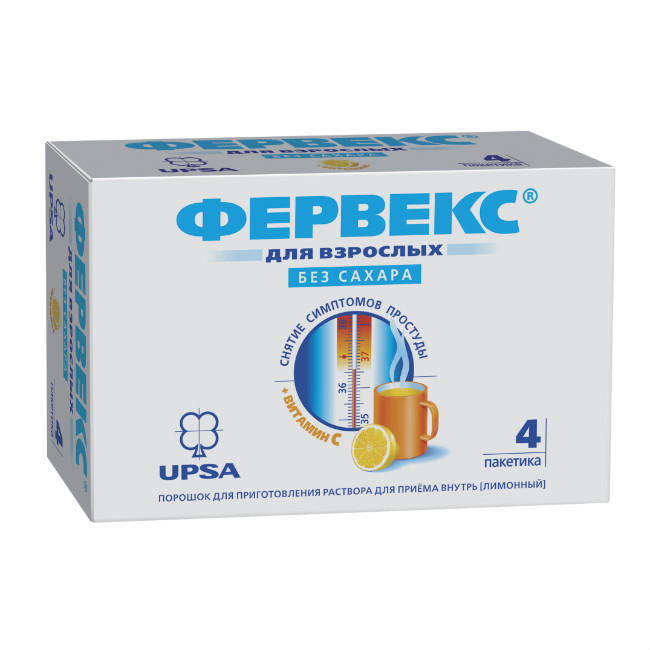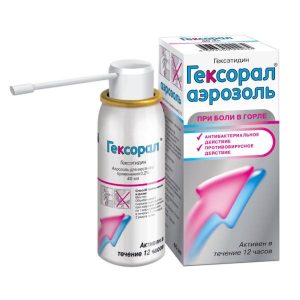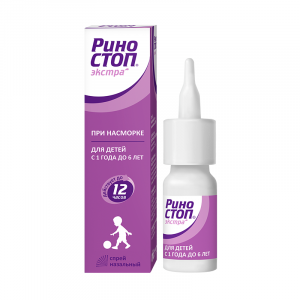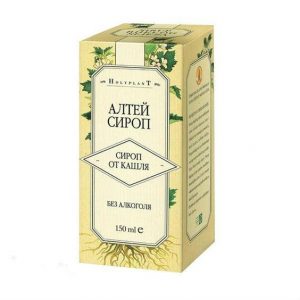Description
Pharmacological action
Means for eliminating the symptoms of acute respiratory infections (ARI) and the common cold (analgesic non-narcotic drug + H1-histamine receptor blocker + vitamin).
ATX Code: N02BE51.
Pharmacological properties of
Pharmacodynamics
Fervex ® is a combined preparation that contains paracetamol, pheniramine and ascorbic acid. Paracetamol is a non-narcotic analgesic that blocks cyclooxygenase, mainly in the central nervous system, acting on the centers of pain and thermoregulation has an analgesic and antipyretic effect.
Pheniramine – a blocker of H1-histamine receptors, reduces rhinorrhea and lacrimation, eliminates spastic phenomena, swelling and hyperemia of the mucous membrane of the nasal cavity, nasopharynx and sinuses. Ascorbic acid is involved in the regulation of redox processes, carbohydrate metabolism, blood coagulation, tissue regeneration, in the synthesis of steroid hormones reduces vascular permeability, reduces the need for vitamins B1, B2, A, E, folic acid, pantothenic acid. It improves the tolerance of paracetamol and lengthens its effect (associated with an extension of T ).
Pharmacokinetics
Paracetamol
After oral administration, it is rapidly absorbed from the gastrointestinal tract. The maximum concentration of the drug in plasma is reached 10-60 minutes after administration. It is quickly distributed throughout the body tissues, penetrates the blood-brain barrier. Communication with plasma proteins is insignificant and has no therapeutic value, but increases with increasing dose.
Metabolism occurs in the liver, 80% of the dose taken enters into a conjugation reaction with glucuronic acid and sulfates to form inactive metabolites 17% is hydroxylated to form 8 active metabolites, which are conjugated with glutathione to form already inactive metabolites. One of the hydroxylated metabolic intermediates exhibits a hepatotoxic effect. This metabolite is neutralized by conjugation with glutathione, however, it can accumulate and in case of an overdose of paracetamol (150 mg of paracetamol / kg or 10 g of paracetamol orally) cause hepatocyte necrosis. It is excreted by the kidneys in the form of metabolites, mainly in the form of conjugates. In unchanged form, less than 5% of the dose taken is excreted. The elimination half-life makes from 1 to 3 hours.
Pheniramine:
Well absorbed in the digestive tract. The half-life from blood plasma is from one to one and a half hours. It is excreted mainly through the kidneys.
Ascorbic acid:
Well absorbed in the digestive tract. The time to create the maximum therapeutic concentration (TCmax) after oral administration is -4 hours. It is metabolized mainly in the liver. It is excreted by the kidneys, through the intestines, with sweat, unchanged and in the form of metabolites.
* Flavor composition: maltodextrin, acacia gum, -pinene, -pinene, limonene, -terpinene, linaloal, neral, -terpineol, geranial, dextrose, silicon dioxide 551, butylhydroxyanisole.
Indications
It is used for acute respiratory infections, acute respiratory viral infections, rhinopharyngitis to alleviate the following symptoms:
rhinorrhea, nasal congestion
headache
elevated body temperature
lacrimation srdlp.
Contraindications
Hypersensitivity to paracetamol, ascorbic acid, pheniramine, or any other component of the drug.
Erosive-ulcerative lesions of the gastrointestinal tract (in the acute phase).
Hepatic failure.
Angle-closure glaucoma.
Urinary retention associated with diseases of the prostate gland and impaired urination.
Portal hypertension.
Alcoholism.
Phenylketonuria.
Children’s age (up to 15 years).
Pregnancy and lactation (safety has not been studied).
Precautions
Renal failure, congenital hyperbilirubinemia (Gilbert, Dubin-Johnson and Rotor syndromes), viral hepatitis, alcoholic hepatitis, advanced age.
Special instructions
The drug is sugar free and can be used by patients with diabetes mellitus.
Fervex ® should not be used concurrently with other medicines containing paracetamol. In order to avoid toxic liver damage, paracetamol should not be combined with alcoholic beverages, and should also be taken by people prone to chronic alcohol consumption.
The risk of developing liver damage increases in patients with alcoholic hepatosis.
When exceeding the recommended doses and with prolonged use, a mental dependence on the drug may appear.
In order to avoid an overdose of paracetamol, you should make sure that the total daily dose of paracetamol contained in all medications taken by the patient does not exceed 4 g.
Effect on the ability to drive vehicles and
mechanisms Given the possibility of developing undesirable effects such as drowsiness and dizziness, the period of treatment with the drug is recommended to refrain from driving and mechanisms.
Dosage and administration
Inside – 1 sachet 2-3 times a day. Before use, the contents of the bag must be dissolved in a glass (200 ml) of warm water. The maximum duration of treatment is 5 days. The maximum daily dose of paracetamol is 4 g (8 packets of the drug Fervex ®) with a body weight of more than 50 kg. The interval between doses of the drug should be at least 4 hours.
In patients with impaired renal function (creatinine clearance <10 ml / min), the interval between doses should be at least 8 hours. If symptom relief is not observed within 5 days after starting the drug, the body temperature remains, or after the initial decrease it suddenly rises again, consult a doctor. Side effects The drug is well tolerated in recommended doses. Possible dry mouth, nausea, vomiting, abdominal pain, impaired urination, constipation, allergic reactions (erythema, skin rash, itching, urticaria, Quincke’s edema, anaphylactic shock), drowsiness, accommodation disturbance, palpitations, orthostatic hypotension , impaired coordination, tremors, confusion, hallucinations, impaired attention (more often in elderly patients). Rarely – anemia, leukopenia, agranulocytosis, thrombocytopenia, agitation, nervousness, insomnia. If you experience any adverse reactions, stop taking the drug and consult your doctor. Overdose of Symptoms of acute paracetamol poisoning include anorexia, nausea, vomiting, epigastric pain, sweating, pale skin, drowsiness. After 1-2 days, signs of liver damage appear. In severe cases, liver failure, hepatonecrosis, encephalopathy and coma develop, which can lead to death. Signs of pheniramine poisoning are convulsions, impaired consciousness, coma. If symptoms of poisoning appear, stop using the drug immediately and consult a doctor. Gastric lavage, administration of enterosorbents (activated carbon, hydrolysis lignin), intravenous or oral administration of an acetylcysteine antidote (if possible, in the first 10 hours after an overdose), symptomatic treatment is recommended. Storage conditions At a temperature of 15 to 25 ° C. Keep out of the reach of children! Expiration 3 years. Conditions without prescription powder dosage form for oral administration Appointment Dlya vzrosl h Indications Hrypp, cold, Nasmork




